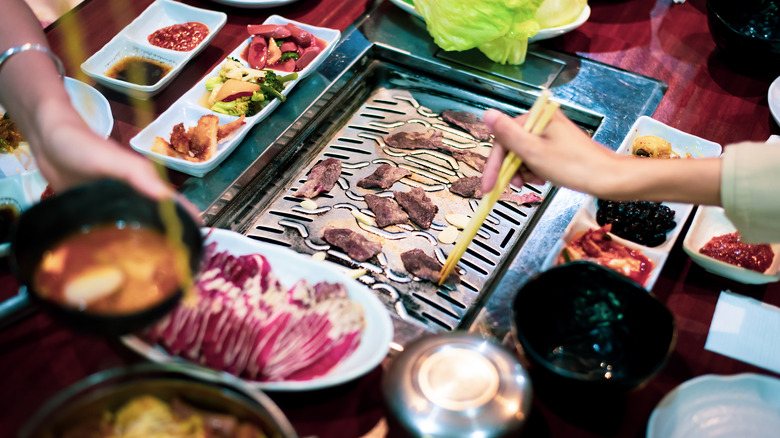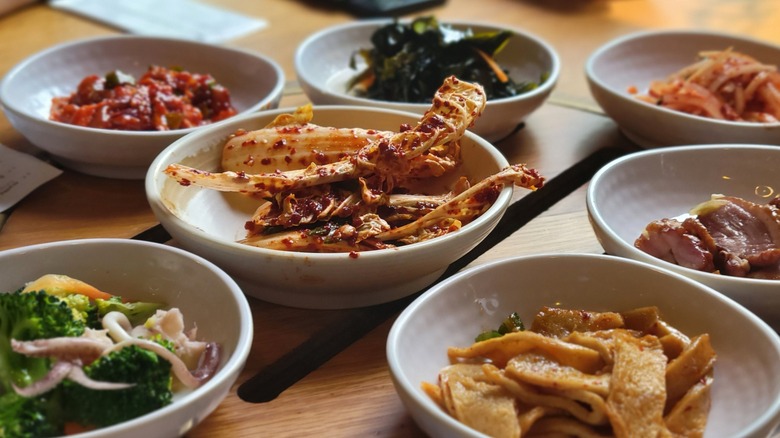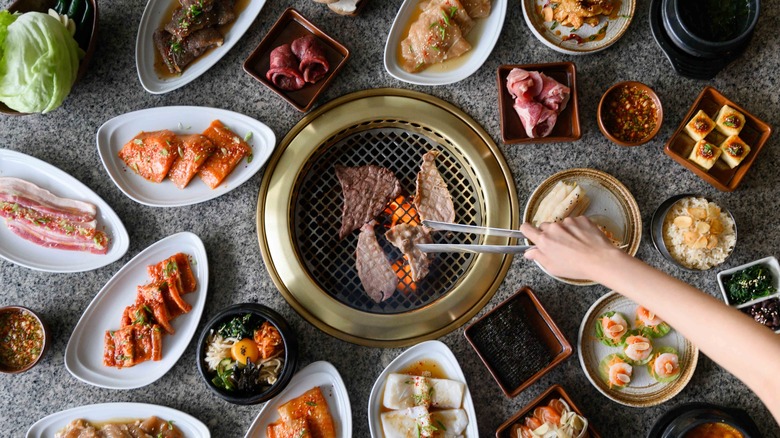We Asked An Expert: This Is The Etiquette To Remember When Eating Korean BBQ
If you go to a Korean BBQ restaurant, you can expect to sit at a table with a grill built right into it and cook your own meats, which have been pre-marinated and are all ready for grilling. You can also expect to be served banchan, a variety of communal side dishes meant to be enjoyed with the main courses. The side dishes may include seasoned soybean sprouts known as kongnamul, spicy pickled cabbage known as baechu kimchi, pickled radish known as danmuji, or different types of edible seaweed.
Overall, it's an immersive and delicious dining experience. But if you're new to Korean BBQ, you may be wondering one important question: Are there any etiquette rules that you need to know? To find out, Tasting Table spoke with an expert: John Bach, the executive chef and founder of Seoul Food KBBQ Catering in Los Angeles. In short, the answer is yes — there are a few etiquette rules you need to keep in mind. To start with, it's unacceptable to eat with your hands — for the most part.
When asked if you could forego utensils and barehand your food, Bach said, "According to my mother, absolutely not." The reasoning comes down to general Korean culture. The exceptions are ssam vegetables (Korean lettuce wraps) or bone-in ribs. Otherwise, pick up those chopsticks! Bach continued, "Koreans take pride in their etiquette and eating just about anything else with your hands is considered uncivilized. (It's still my mother talking)." Now that we have one very important detail covered, what else do you need to know?
Sharing banchan dishes comes with rules
John Bach acknowledged that non-Koreans may be wary about sharing the communal banchan dishes with everyone at the table, but explained that it's an integral part of the experience. He said, "For Koreans, a meal in itself is considered to be an intimate [occasion] shared almost exclusively with close colleagues, friends, and family. That intimacy shows when everyone at the table is totally OK with dipping all their spoons into the same soup bowl." However, he admits that the sharing can easily become "pretty gross" without some rules.
Thus, there are two key things to keep in mind. Firstly, don't be picky. Bach said, "Don't toss around all the banchan or meat with your chopsticks looking for a better piece. Try to touch your chopsticks only to the piece that you will eat." Secondly, keep it clean. Bach explained, "Do not, under any circumstances, leave a trace of what was on your spoon in the soup or any shared dish that requires the use of your spoon." This includes grains of rice left in soup or streaks of kimchi on potato salad.
He continued, "Just make sure that your spoon is free from debris or stains before you [accidentally] claim an entire dish to yourself." Of course, accidents happen — just be sure to pick up anything left behind with your spoon. If you need help remembering this, Bach has a trick. He concluded, "Remember this Arapaho Native American proverb, 'Take only what you need and leave the land (banchan) as you found it.'"
Be proactive and concise when interacting with your server
Because the guests cook their own food at the table, the interaction with the server is more minimal than you may be used to at other restaurants. In fact, they may not check up on the table super often. John Bach explained, "Korean restaurants are typically minimally staffed with servers who are constantly refilling tiny banchan dishes for multiple tables, so you will often see them briskly walking past you without ever checking to see how you're doing, but will always respond if you ask."
To get their attention, all you have to do is wave, make eye contact, or politely say "excuse me." When you are speaking to a server, make sure to take advantage of the server's attention when you have it. Bach says, "An unspoken etiquette when you have their attention is to try [and] ask them for as much of the items you need all at once instead of asking for something new [every time] they return."
Additionally, there may be a bell at the table intended for getting servers' attention — Bach insists that you should not feel weird about using the bell. He says, "It's there so they can be efficient with their service and you can leave a happy customer."


